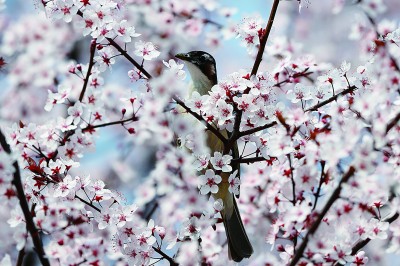【Go to Xintiandi in the New Era·Guardian Folk Songs】
Spring solstice flower blooming day folk song is just in time
——Dream chasers who innovate and explore on the road of folk song development
Guangming Daily reporter Peng Jinghui Li Danyang
Under the lights and on the stage, Humai went from the singer’s throat to the eardrums of the audience, and the sound was like the top of the sky, the bottom of the vast ocean, and the neighing of a horse. Ao Riqi, a post-90s folk singer, opened his voice and took people to the prairie of Inner Mongolia, and his thoughts returned to a small stage more than 20 years ago: at a family party, the shy 5-year-old boy Ao Riqi stood stunned in front of the crowd and gathered up his courage to sing a folk song. In the warm applause, the boy felt the value of his voice for the first time, and quietly “planted the dream of folk songs in his heart like a sapling”.
This dream boarded the train of years and came to the “big stage” – Hunan Satellite TV’s “Spring Flowers Will Bloom” program. On the same stage, a few meters away from Aoriqi, another child dreaming of folk songs raised the microphone. The high-pitched Uyghur singing of the post-90s young singer Maimaitijiang Maiticasmuna collided with the sound of Khumai. With a strong stylistic contrast, the two voices blend together without any inconsistency in one song.
“A little song “Olive Tree” with a European style makes people feel the grassland pastures and the Gobi desert in China. It is played by young people with the taste of Chinese folk songs!” The audience sighed with emotion.
In the past few years, there has been a folk song craze among the youth groups. A group of folk song youths continue to explore, trying to combine traditional folk songs with modern music, so that the inspiration of the original ecology and the technical style of the academic school collide with each other. The creators of the “Spring Flowers” program paid attention to this phenomenon early, and they concluded: “Young people make folk songs show a different style, with richer expressions and stronger communication power.”
In the opinion of Hu Tingjiang, associate professor of the Composition Department of China Conservatory of Music, as a representative of the excellent traditional culture of the Chinese nation, an important feature of Chinese folk songs is inheritance, and the innovation of young people conforms to the essence of folk songs and can gain sustained and long-lasting vitality.
1. Folk songs are not lost in their hometown
For decades, with the process of urbanization, people moved from the countryside to the city. For a long period of time, folk songs mainly “grown” in the soil of agricultural production and pastoral life seem to be preserved in their hometowns. In the 1990s, when Ao Riqi Leng and Mai Mai Ti Jiang Mai Ti Ke Si Mu were born, pop music has already begun to occupy the players and headphones in people’s hands, and folk songs gradually faded out of many people’s field of vision.
“I liked it since I was a child, I couldn’t let it go, and it never changed.” In his concise and powerful words, Ao Riqi stunned to express his different views, “Actually, many young people around me who came to big cities together have never left folk songs behind. complex.”
In the prairie of Inner Mongolia, where he was born and raised, folk songs accompany his life, old age, sickness and death, marriage, funeral, and marriage. “All grandparents and fathers can sing, and any mood can be expressed by singing, which is natural, pure and profound.” Ao Riqi was determined to follow the path of folk songs when he was a teenager, and he never doubted whether this life path would be successful.
This confidence comes from his understanding of the vitality of folk songs, and also from the real feeling that folk songs bring him – happiness. After coming to the city to develop, he did not forget “the grassland behind him”, the stage, subway, street, wherever he walked, the background sound of grassland folk songs always haunted his mind. Together with many young people, he guards the desire to inherit folk songs.
His partner Maimedijan Maiticasmu hasn’t “departed” for folk songs for a long time. Even today, he still positions himself as a rock musician. “It’s just that folk songs are too charming to learn.” . In 2011, at a foreign music festival, a combination of folk and rock songs from a Chinese band “cut out” his heart.
“It turns out that music can do this!” Maimedijan Maiticusmu, who is devoted to rock music, saw that foreign music fans responded with “almost crazy applause” to this kind of song with strong Chinese flavor. As a result, in his “music experiment”, the fusion of various ethnic music began. While studying, he came into contact with more and more people. When sorting out his mobile phone address book, he discovered that his colleagues who were studying the combination of folk songs and modern music “couldn’t finish it even after turning several pages.”
In the “Spring Flowers Meeting” program, the two also jointly chose the Mongolian folk song “Paradise”, one in Mongolian and the other in Uyghur, expressing their common wish: “Tell all young people who go out, Just as folk songs are not lost in our hometown, our nostalgia is not lost in city life.”
Xinhua News Agency

Ao Riqi Leng (left) and Mai Mai Tijiang Maiticasmu Photo provided by the interviewee

Gong Shuang Photo courtesy of the interviewee

Guo Qu Photo courtesy of the interviewee
2. The same work, the singer endows it with different era marks
Young professional singer Gong Shuang is currently studying for a doctoral degree in vocal music at the China Conservatory of Music. In the past ten years, she has been searching for more ways to express Chinese vocal music and deal with details in her singing, and “collected” a singing method. , The largest “emotional intersection” that can be gathered in a song.
“Emotions of each of us are like a drop of water. The emotions of a group of people can be gathered into a wave. When the emotions of countless people are together, there will be a river, a river, and the common heart of Chinese children.” Born in Hubei , Gong Shuang, who grew up by the Yangtze River, regards her singing as a drop of water in the Yangtze River. She hopes to cross the river, cross the lake, go to farther places, and stir the ears of more people; Always understand where you came from and where you are going.
“We praise the Yangtze River, you are an infinite source; we are attached to the Yangtze River, and you have the feelings of a mother…” In the singing of Yin Xiumei and other singers, “Song of the Yangtze River” reached the chorus part, and it was surging like a huge wave, Splendid. And Gong Shuang, who grew up in the era of rapid economic and social development, used another way of dealing with the chorus – smooth and gentle like a trickle.
“It’s like a child lying in his mother’s arms, whispering softly to his mother.” Gong Shuang said, “We live in a stable and happy era, and the mother river I usually see is like this.” The whole song progresses slowly, and the emotion gradually becomes stronger, “the trickles continue to gather”, until the emotional eruption at the end, “arrives at the sea”. This is the Yangtze River told by the girl who grew up by the Yangtze River with her singing.
Similar attempts, Gong Shuang started a few years ago. “At that time, I sang the theme song “My Motherland” of the movie “Shangganling” in a performance.” Gong Shuang recalled that in the past, the chorus part of this song was the rhythm of the march, because it wanted to show the fire of gunpowder and battle scenes. So high-spirited and passionate.
Gong Shuang adapted it into a lyrical passage and sang it in a way of “stretching long lines”. “The ‘beautiful motherland’ and the ‘strong motherland’ in the lyrics have already become a reality. Our contemporary young people enter the new era with a calm and confident attitude. So I want to express the motherland we really feel with singing.” Gong Shuang said, The same work, the singer can give it the brand of different times.
And such exploration is not easy. Today, when the cultures of various countries are colliding and blending fiercely, many young singers like Gong Shuang hope that more people with this idea will participate, think and try together, “Only in this way can we find Chinese vocal music and Chinese folk songs. more development paths”.
3. Respect every note from real life
Young music producer Guo Qu has also recently joined the “Folk Song Family”. “There are two emotions about folk songs, one is love, and the other is awe.” Guo Qu did not hesitate at all when he had the opportunity to dabble in folk songs and try the fusion of folk song elements with electronic music and pop music.
“Among the youth groups I have come into contact with, there are aesthetic faults in folk songs.” Guo Qu introduced that in some of his works, elements of songs such as “Jasmine Flower” and “Where the Peach Blossoms Bloom” can awaken many parents. memories, but some young people have difficulty resonating.
Some scholars have also emphasized the same problem. Compared with popular songs, the dissemination channels of folk songs are more limited.
“Maybe I can do a little bit to solve this problem myself.” Guo Qu quickly discovered that the fusion of folk songs and various kinds of music is not a process of “packaging”, and no audience will pay for a “simple graft” work. To solve the problem of aesthetic fault and let folk songs be accepted by more young people, it cannot be done overnight.
“The biggest difficulty is how to accurately grasp the scale, so that the work not only retains the spiritual core of classic music, but also has an appropriate musical language.” Guo Qu regards this as the biggest challenge, he said, “We must be cautious and restrained, and do not do anything. At this point, don’t rush to innovate.”
When arranging “Usuli Boat Song”, Guo Qu almost completely maintained the musical appearance of the whole song. “In fact, there has not been much change in temperament. The original work shows people’s freedom and happiness incisively and vividly, and there is no need to make ‘superfluous’ changes.” Guo Qu earnestly practiced his principle of “prudence and restraint”, It also pays attention to understanding the background of the birth of folk songs, and pays attention to collecting folk songs on the spot.
This view is endorsed by Hu Tingjiang. In his opinion, folk songs are not only the presentation of melody, but also a representation of life. If young people want to inherit and carry forward folk songs, they must take root in the soil of the people, go deep into people’s lives, and experience, dig, and condense. “The more convenient the Internet is, the easier it is for us to search for a melody, and the more we have to respect every note from real life.” Hu Tingjiang said.
“Don’t do it deliberately, let it be natural.” On the stage of “Spring Flowers Will Bloom”, Guo Qu was proud of a peaceful and warm trumpet sound in the song “Listen to Mom Talking About the Past”. Guo Qu said: “There is no specially formulated artistic conception, and there is no specially preset emotion. Let the note itself communicate with the audience, let it become a platform, and let the audience put the real emotions they want on it.”
“Guangming Daily” (12th edition on April 12, 2022)
[
责编:孙宗鹤 ]
